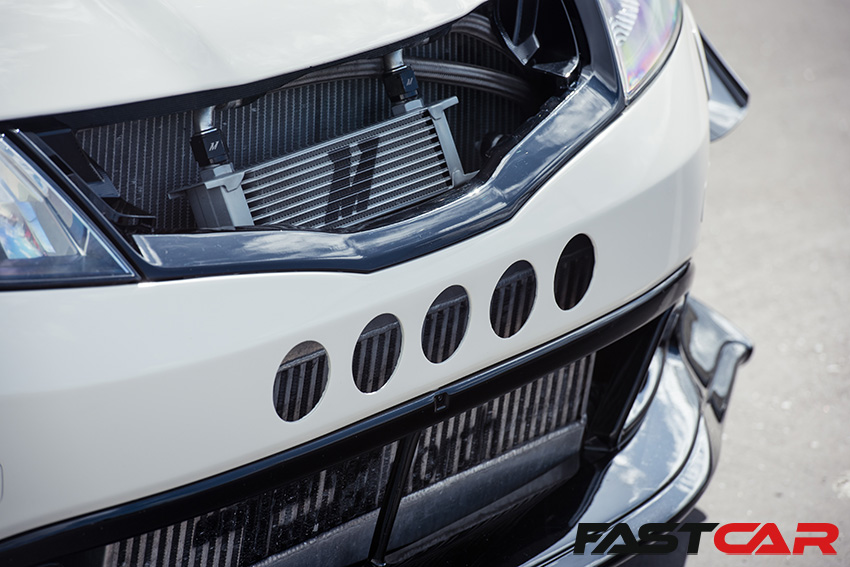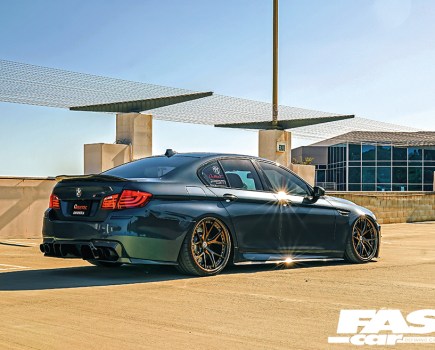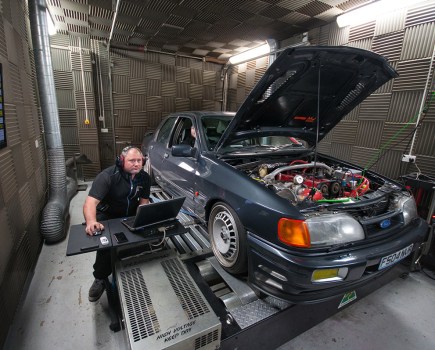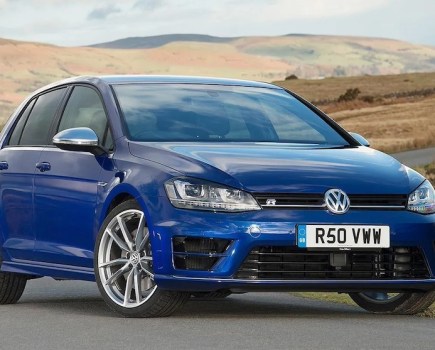If you’re running a car with forced induction, you’ll need an intercooler to keep temps in check. Here are the best intercooler brands to choose from.
Engines enjoy being hot and bothered just as much as we do – which isn’t very much. So, do your car a favor and keep on top of its running temperatures, especially if you’ve tuned it or just regularly drive it hard. We’ve already guided you through the process of upgrading your radiator, but if your car has forced induction, it may benefit from an uprated intercooler too. Want to know more? We’ve got you covered.
What is a car intercooler?
Before we get stuck into who the main trusted aftermarket retailers are, it’s probably best that we bring you up to speed with what an intercooler actually is, and why you need one. So, let’s do that!
When air is pressurized, it heats up, and when you use a turbocharger or supercharger, the air that those components channel becomes highly pressurized. The more boost you have dialed in, the more pressurized the air will be. Unfortunately, hot air isn’t optimal for engine operation, meaning you’ll be down on both performance and reliability if you let things get too spicy in there. So, to improve that state of affairs for forced induction vehicles, manufacturers install intercoolers. These bits of kit take in outside air (hopefully of the cold variety) and channel it into the flow of pressurized air coming into the engine from the turbo/supercharger.
While in most cases you’ll be dealing with an air-air intercooler as described above, some cars have air-water intercoolers which are significantly more complex. As you’ve probably inferred, those systems use water as a cooling device instead of cold air, and as such require a whole load of supporting gear like an extra water pump and radiator.
Anyway, that’s a very brief explanation. If you want to study the finer details of car intercoolers and their implementation in tuned cars, make sure to read our comprehensive intercooler tech guide.
Best Car Intercooler Brands
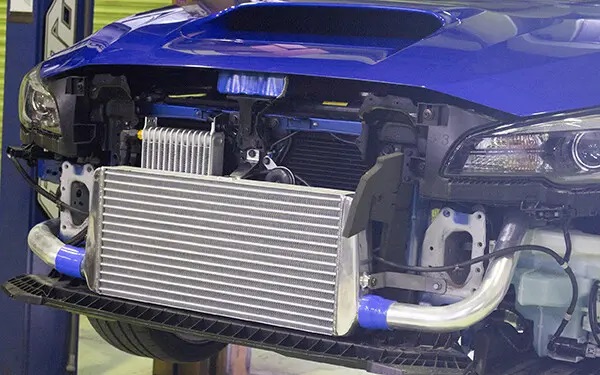
GReddy
It makes sense that good radiator companies will also be pretty handy at building intercoolers. So, if you’ve read our radiator brands guide, there will be plenty of names here that you recognize – like GReddy. As you might know, GReddy is much more than just a cooling specialist. In fact, alongside HKS (more on them next), GReddy was at the forefront of the dawn of the JDM tuner scene. That reputation has stood the test of time, now not only a titan in Japan but also big enough to have its own US branch. GReddy parts are pretty easy to source in Europe too.
As far as intercoolers go, GReddy caters to all the core Japanese enthusiast models models, and even some slightly more niche ones like the Daihatsu Copen. If you’re dead-set on getting GReddy parts for a car they don’t specifically supply, you can also choose from a selection of universal intercooler kits.
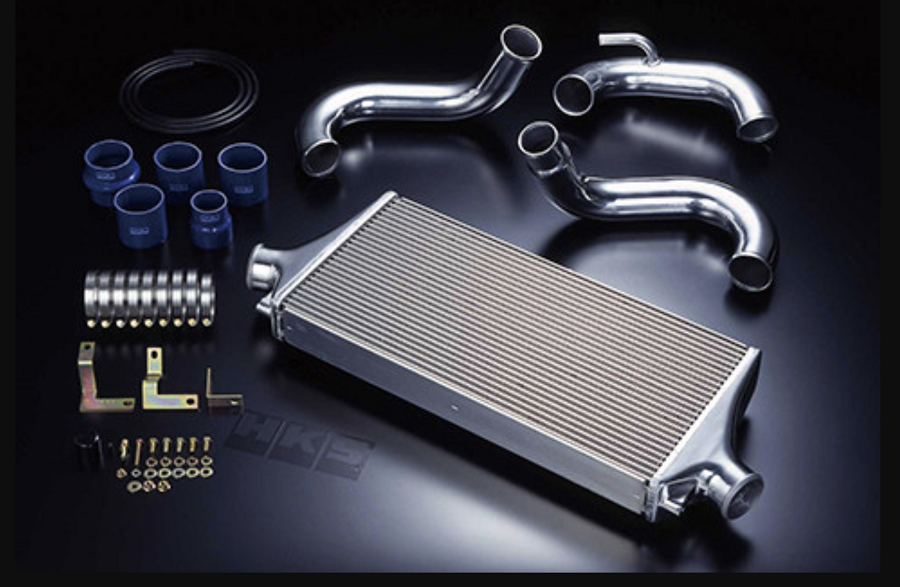
HKS
Like GReddy, HKS is a big name in the world of Japanese performance tuning. So, naturally, they provide parts for domestic Japanese cars.
The HKS intercooler range is divided into two; ‘S Type’ intercoolers, and ‘R Type’ intercoolers. This is simply how HKS brands their different ‘stages’ of product. For example, the S Type intercooler design is crafted with regular street builds in mind, whereas the R-Type intercooler is mainly for circuit cars or builds with seriously high levels of boost. Both styles feature short inner fins and triangular louvre style outer fins. The size and angling of these fins has cooling efficiency in mind, while not being detrimental to the rate of flow. Plus, the R-Type cooler is supposedly around 25% lighter than what you’d expect an OEM intercooler to weigh.
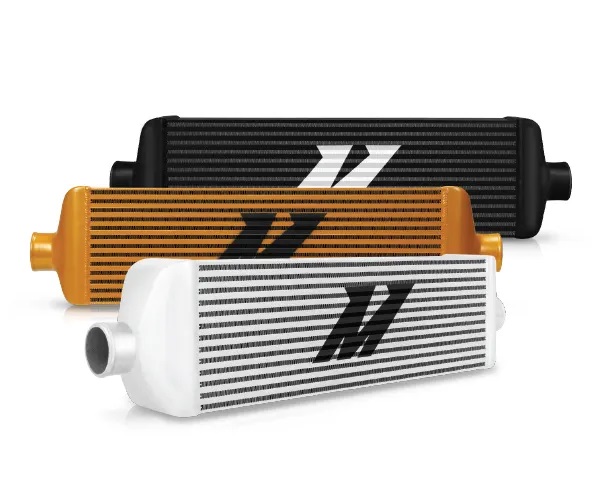
Mishimoto
Many people make the mistake of thinking that Mishimoto is another Japanese tuning brand, but they’d be wrong. It was actually first established in the United States in 2005.
Above all else, Mishimoto is great at making cooling products – their radiators and intercoolers are not only hugely efficient, but they look excellent too. You can source specific kits for a truly expansive range of cars, from Civics to Camaros, or simply go down the universal route and order a kit to the specific dimensions you’re after. Mishimoto has one of the best retail sites we’ve seen for buying intercoolers on. You can filter buy all sorts of crucial specifications, the main ones being stuff like core thickness, piping diameter, and maximum recommended boost levels. But you can get real nerdy with your requests.
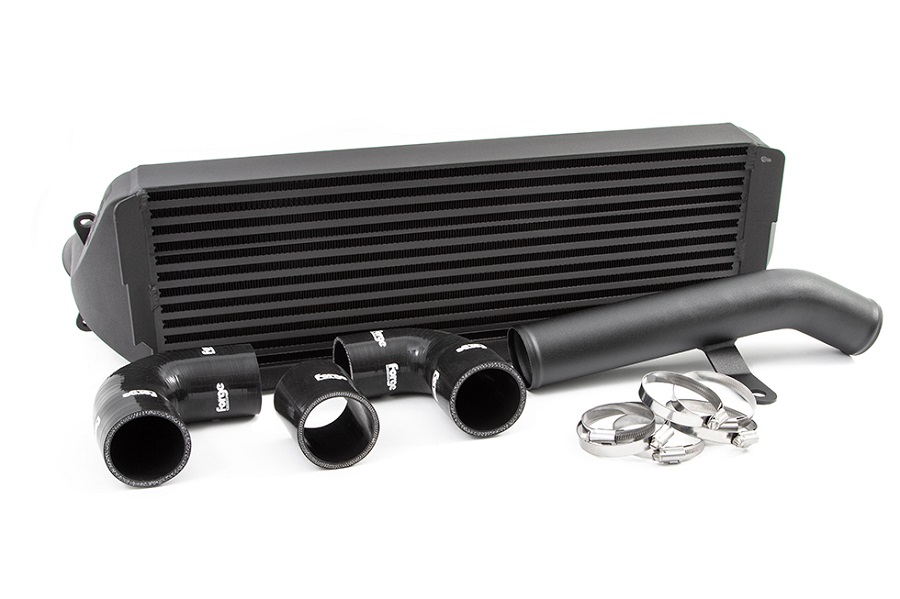
Forge Motorsport
Forge has been around in its current guise since 1996, and although based in Britain, has outlets in North America and Asia too. It’s evident that they take a lot of pride in what they do, and they even offer a lifetime warranty on all the parts they supply. So, you know you’re getting good quality stuff from a group of people who seem to want to do right by their customers.
Forge’s experience stretches beyond just aftermarket tuning parts. They’ve had plenty of OEM commissions, and have provided homologated parts for teams in a range of motorsport championships – from rallycross, to touring car racing, to Le Mans.
Each Forge intercooler is designed to for application with a certain car (usually European hot hatches, and they’re a big player in the Hyundai scene too). They feature either tube and fin or bar and plate cores, depending on application. The intercoolers are finished in either silver aluminum or a black thermal powder coat to combat the onset of rust further down the line.
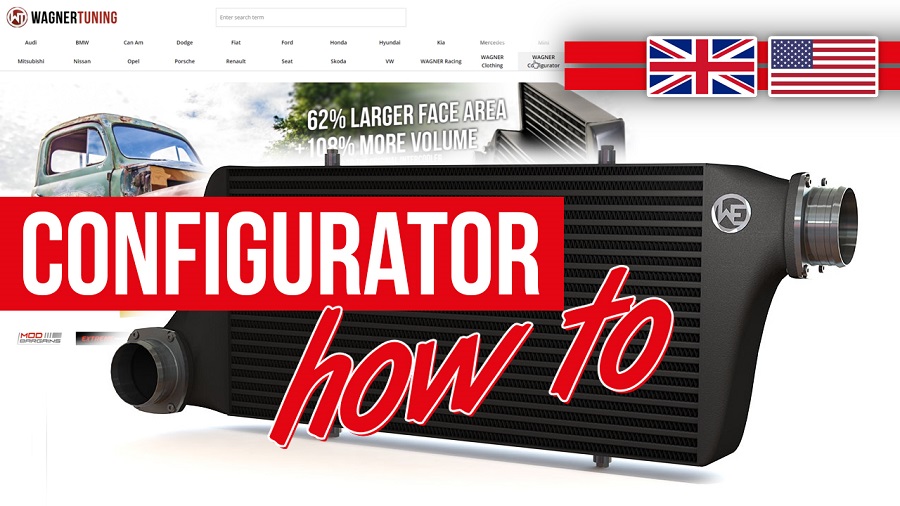
Wagner
Wagner is a 21st Century TUV-certified German tuning company, which specializes in intercoolers above all else. It caters for 23 different marques – mostly European ones, though the big names from Japan are included too. However, if you find that Wagner doesn’t already produce an intercooler set-up for your specific car, you can use their online configurator. It’s easiest to access on the core German website rather than that of their US and UK distributors, but is a remarkable tool for tuners who know exactly what they want in terms of dimensions and performance.
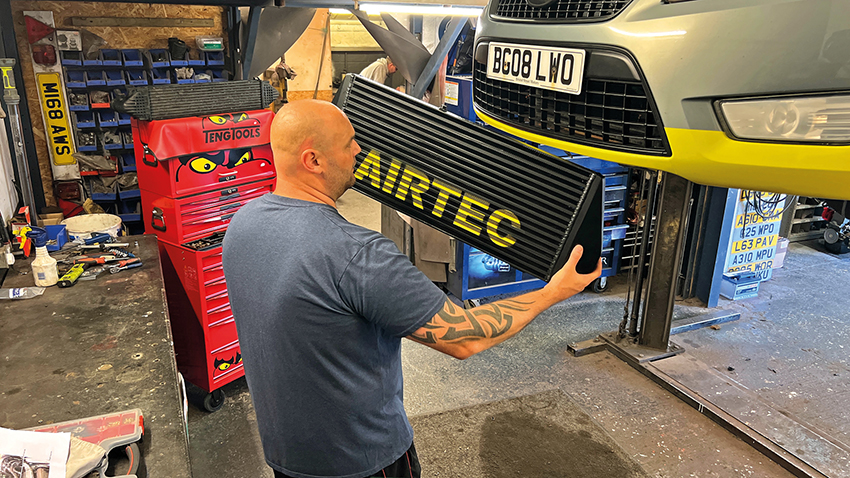
Airtec
Airtec is, as the name suggests, a tuning brand which focuses on parts which improve your car’s airflow & cooling; mainly radiators and intercoolers. The Essex-based company produces upgrades for more than 20 different car brands, but Fords are where you’ll see their products utilized most often. This is a hangover from their Ford-specific days back in the ’90s, under the banner of AutoSpecialists. Airtec in its current form debuted in 2002, and in the 20+ years since has developed over 1500 different upgrade parts.
Although British in origin, Airtec supplies customers on a global scale, and is even trusted by film production companies to supply parts for stunt cars which endure plenty of hard use. Speaking of hard use, we chose Airtec as the intercooler supplier for our Mondeo track car project!
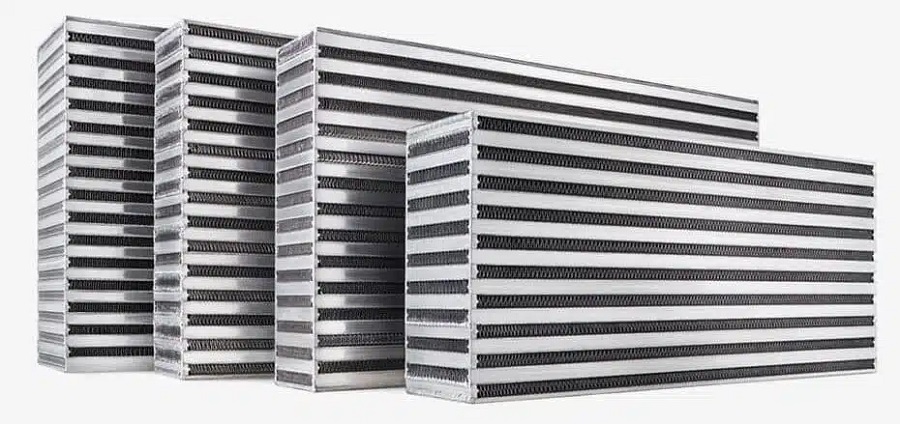
Garrett
Garrett is one of the biggest names in the American tuning scene, and their reputation extends across the pond and around the globe too. They’ve been in business for more than 65 years, and during that time have supplied OEM parts for over 100 million vehicles. However, the Garrett business DNA can be traced back to wartime; the company’s founder John Clifford Garrett produced his first intercooler (designed for aircraft) by the end of the 1930s. As you can imagine, this is a company which knows the art of forced induction and cooling methods, inside out.
In the modern day, Garrett’s aftermarket range of intercoolers includes both air-air and air-liquid intercoolers, with maximum capacities of between 300-1275 horsepower.
Garrett supplies some real hardcore hardware for other tuning brands too. If you’ve ever seen big 1000+ horsepower Nissan GTR builds, in the UK at least they’ll often be running intercoolers supplied by AMS Performance, which are actually Garrett products – something which AMS is very clear about on its website. Whatever sort of build you’re undertaking, Garrett are likely to offer something to suit.
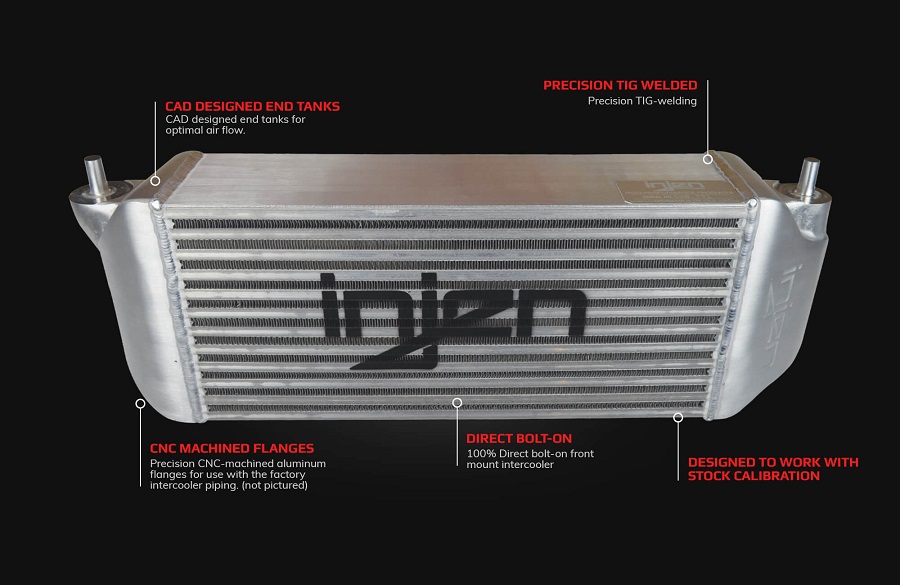
Injen
Headed up by enthusiastic entrepreneur Ron Delgado, Injen first arose as a tuning brand in the early ’90s, and since then has blossomed into an international-scale name within automotive enthusiast circles.
On their website, Injen proudly displays a dyno chart which shows gains of 10-15 horsepower from an intercooler upgrade alone. Like most reputable intercooler brands, Injen constructs its products from aluminum and ensures that every seam is TIG-welded. Injen intercoolers are designed to be fairly straight-forward drop-in parts, focusing mainly on Honda and Ford models for the US.
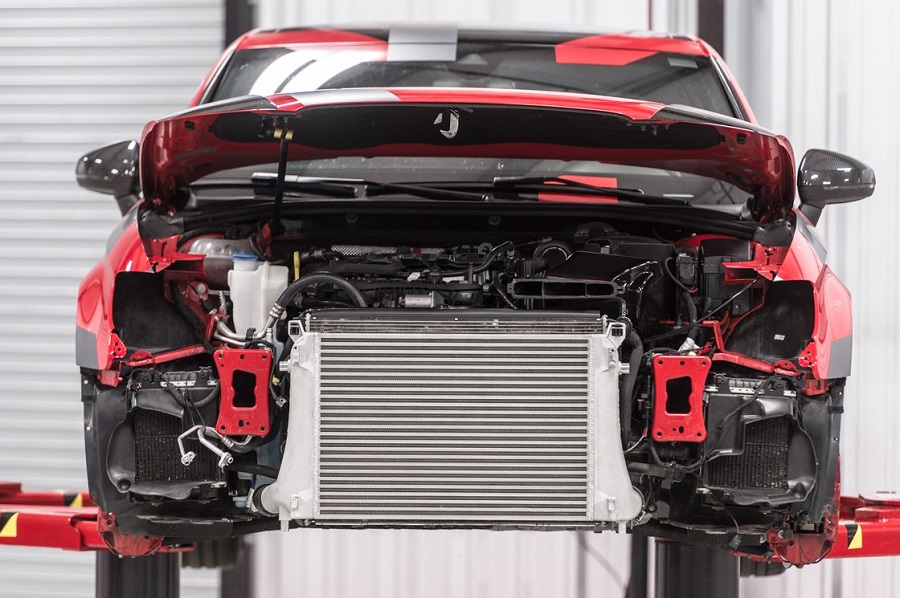
APR
APR is a tuning company which caters almost solely for Volkswagen-Audi Group vehicles, so if you drive anything under that umbrella, they’re well worth checking out.
They offer both air-air and air-liquid intercoolers, but to give you a proper idea of what sort of quality you can expect, let’s use the MQB-platform intercooler as a case study. APR quotes gains of 21 horsepower over stock from this intercooler alone, remaining effective until just past the 500hp-mark. And frankly, you wouldn’t want much more than that in a Mk7 Golf or any of its platform cousins!
And, because the folks at APR know VAG motors like the back of their hand, you’ll have no installation worries.
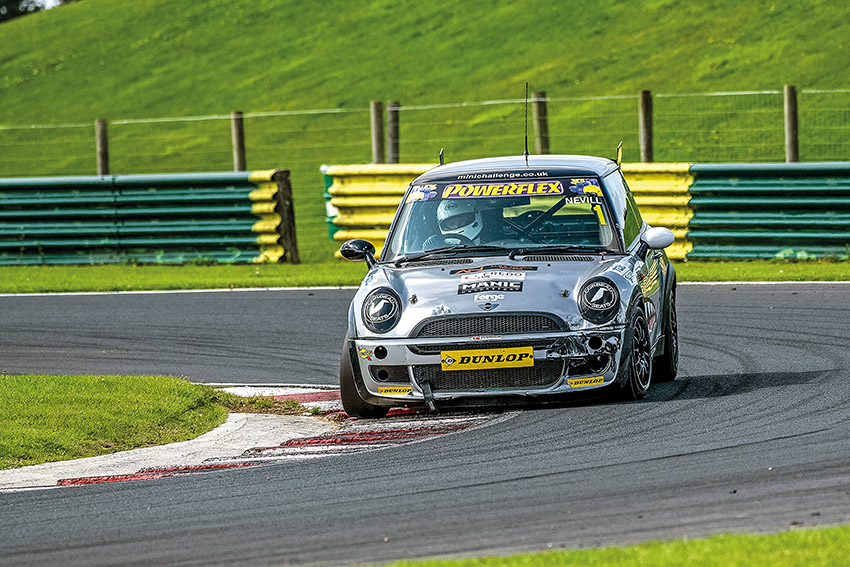
When to upgrade your car intercooler
Stock intercoolers often aren’t great at their jobs when the car is pushed hard, even with stock internals. So if you’re regularly driving in a manner which creates enough heat to affect performance negatively (frequent track days, let’s say), then it’s worth getting a beefier intercooler. That’s especially true if you’ve tuned your car to make more power with an uprated turbo or supercharger. Increased boost levels mean more pressure than the stock intercooler was ever designed to combat.
That said, it’s not just high running temperatures that upgraded intercoolers help with. The volume of air that your engine takes in is more important than how hot or cold that air is, but some stock intercooler designs aren’t brilliant in regards to optimal airflow. If your car’s intercooler is too small, it can actually restrict maximum flow and therefore power. Positioning is important too. Most marques mount standard intercoolers to one side or even on top of the engine, however any respectable intercooler upgrade will place the intercooler in the ideal position for air flow: front and center, behind the front bumper.
As an added aid, you might even wish to install an intercooler spray system. By spraying the intercooler with water, the resulting evaporation will draw heat away, further helping to cool the air which passes through the intercooler and then into the cylinders.
How to buy the best car intercooler
The first thing to note is that depending on which car you own, there may be a generally preferred brand to side with. Often, this will be because the brand is particularly experienced with a certain marque or genre of vehicle. For instance, AMS is a popular intercooler supplier for big-horsepower Nissan GT-R builds, whereas you’ll often see Airtec equipment on Fast Fords.
The next thing to consider is how much boost you’re running. If you’re running a near-stock supercharged R53 Mini, maybe with a 15% pulley, you’re going to need much less cooling power than someone with a 1000hp+ twin-turbo Huracan. So, while it’s good to be proactive about engine cooling, it wouldn’t make much sense to put a heftier, expensive race-spec setup with a massive core and bigger bore piping in a street car which will never reach that intercooler’s limit. When it comes to modifying and tuning cars, the key is balance – and that goes for intercoolers too. If its capabilities feel disproportionate to the rest of the car (in either direction), then you’re on the wrong track. Helpfully, many brands offer different levels of intercooler in clearly defined ‘stages’ to guide you to the right product for your style of build.

